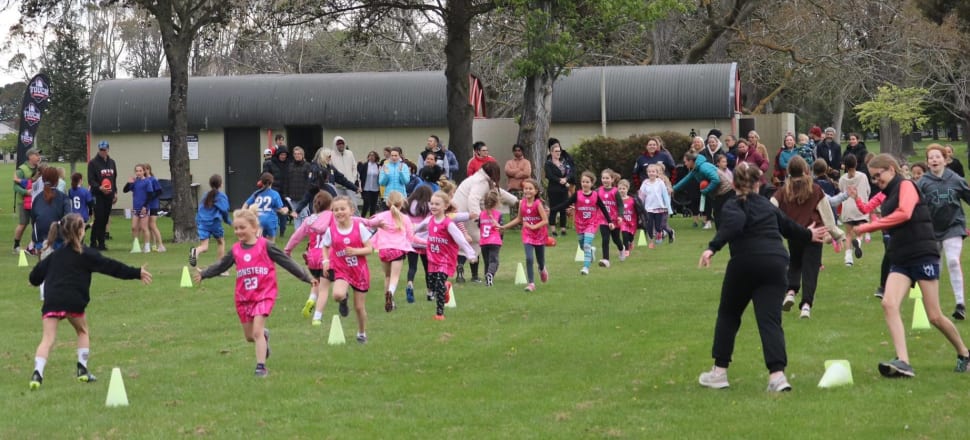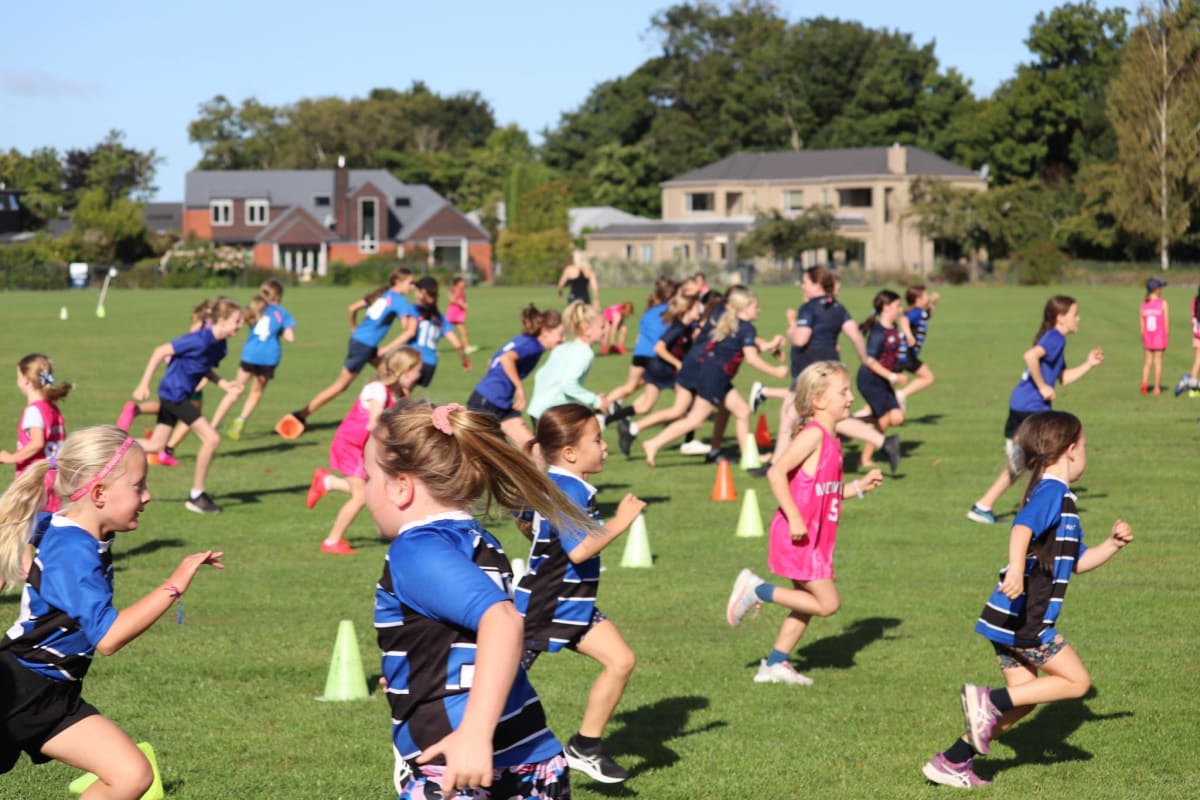
A first of its kind all-girls touch rugby programme in Christchurch has won national accolades and kept hundreds of girls in the game, Merryn Anderson writes.
Liesel Van Schalkwyk knows some girls are happy playing mixed touch - the chance to run alongside brothers and schoolmates on an equal playing field.
But she also knows for other girls, it’s not the best experience - never getting passed the ball, not feeling supported or having a sense of belonging.
That was the motivation for Van Schalkwyk to start an all-girls touch module on Monday nights in Canterbury - the first of its kind in New Zealand.
Now Van Schalkwyk has been recognised by Touch New Zealand as one of their ‘Home Ground Heroes’, an initiative with Bunnings to recognise those who go above and beyond for their communities.
From the 168 nominations this year, the five chosen Home Ground Heroes all received $5000 to invest in their programmes.
Van Schalkwyk is very humble about her involvement in Touch Canterbury, eager to highlight all the work the parents and other staff do, including World Cup-winning touch player and national age-group coach, Corey Tauwhare.
“He’s the man with the vision and the knowledge and the influence,” she says. “He has so many people around him who are passionate about the game and he just takes us all along on the ride.”
READ MORE:
*Young touch star helped by Tania Dalton’s legacy
*Niall Williams waits for word on her sevens future
But it's Van Schalkwyk who got Kōtiro Ātaahua Touch Rugby off the ground. It's the first all-girls touch module in New Zealand, played on Monday evenings at Nunweek Park, with over 200 female players participating every week. Touch Black international players often come and coach the girls, too.
A mum of three, all Van Schalkwyk’s kids played touch, and she noticed her daughter was missing out on opportunities through not having a sisterhood to play with.
“The only option they have is mixed touch and they walk away after a few years cause it’s just not the same as netball, or hockey, where they’re in all-girls teams,” she says.

Van Schalkwyk noticed girls leaving the sport around Years 5 and 6, due to lack of enjoyment and community in teams, so she talked to Tauwhare and others about potentially running an all-girls touch tournament.
“When I went with that idea to Touch Canterbury, they suggested ‘Well why don’t you run a module?’,” Van Schalkwyk remembers. She then got help from parents and volunteers to set up Kōtiro Ātaahua (Beautiful Girl in Māori).
“I really am just co-ordinating, making people talk to each other and moving paper along to see that it all comes to pass,” the modest Van Schalkwyk says.
“The amazing support of Touch Canterbury, the support of parents and coaches - high level coaches - who volunteer is what makes this work.”
Touch NZ chief executive Joe Sprangers says it’s up to the recipients of the Home Ground Heroes awards how they use their money to impact their community.
“It could be anything from buying uniforms to support one of their teams, the module they work at, or they’re involved with. Or it could be to help support a trip somewhere to get kids to a competition,” he says.
“It’s wide ranging. They have the autonomy to make their own decisions but knowing the people, they will make great decisions around it that will help them not have to dip into their own pockets for a change.”
Van Schalkwyk is still deciding what the money will go towards, but has three key ideas.
“We’d definitely want to invest it in uniforms - Corey has this amazing idea to have reversible uniforms so to have singlets, really pretty singlets, so we can mix up teams more,” she says, pointing out that girls feel more confident in nice uniforms.
Having reversible singlets means there can be more options to split up teams and give girls more playing time, without the need to buy multiple shirts.
“We don’t think uniforms play a big part but actually they do give a sense of identity and belonging,” Van Schalkwyk says.
She also hopes to make transport to Nunweek Park easier, especially for those parents who carpool and take other children with them.
“I would love to have petrol vouchers available just to help with transport, especially for people who are carpooling, coming from far and bringing girls who are travelling 50 to 60kms on a Monday,” she says.
Van Schalkwyk is passionate about letting girls know mixed school touch teams aren’t their only option, and wants to visit schools to educate them about other opportunities.
“I would love to pay people for the time they spend to go into schools and do that education about girls touch vs mixed touch,” she says. “Even if it is just thank you vouchers for volunteers taking time off work to do that.”
Van Schalkwyk is always busy talking to girls and their parents, seeing what’s working for the all-girls module.
“I have not met a girl who’s not loving it. And if you ask them why they enjoy playing it, it’s always the same answer: ‘Because the boys don’t pass the ball to me’,” she says.
“When they’re older, they love playing mixed cause then they’re confident and they understand the game and they have the opportunity to learn it. But at a young age, to have that opportunity to play with their girlfriends…they know they’re part of something really cool.”
Sprangers says Touch NZ are proud to be an inclusive sport, where anyone can play on a team, but Van Schalkwyk’s work is breaking down even more barriers for girls.
“She’s been able to make it more appealing and less difficult for the young ladies to engage and be part of the sport, and that in itself is a great thing,” he says. “Sometimes it can be a little bit intimidating going to something like this, particularly when you’re new to it.
“She’s one of these people who engages people easily and makes them feel comfortable and makes it available to them to be part of and to enjoy. We can’t ask for more than that.”
While the emphasis for Monday nights is the fun social aspect (the girls warm up with dances before their full TouchFit 360 warm up), it’s still competitive and a chance for girls to grow and learn.
“Sport is just a vehicle, it’s not the end goal that they’re all exceptional touch players,” Van Schalkwyk says.
“The end goal is that they go out there, have fun with their girlfriends, get more confident because the coaching is exceptional.”

Coaches come from Touch Canterbury, and some New Zealand touch players as well, to develop the girls’ skills and confidence in the sport.
“It’s simple enough that you can walk onto the field and play it, but it’s also technical enough that you can excel at it if you want to,” Van Schalkwyk says.
“By bringing all those girls together with all the different levels of ability and giving them the same high-level coaching, we’re not saying ‘Oh we only reserve this level of coaching for the superstars’. Across the board, these girls get amazing coaching and support.
“They can go and play socially with boys later in mixed teams but they also can go and play seriously competitively because they have been developed into touch players who have knowledge and depth of skills.”
The Kōtiro Ātaahua module on Mondays is a prime example of just how important it is for girls to have a space to grow and make mistakes.
“Team play comes easy to girls, they love sharing the ball, they love passing the ball to each other,” Van Schalkwyk says.
“They really cheer each other on, they celebrate each other, they celebrate tries, and if someone misses a touch, they go ‘Oh that’s not a bad thing’.”
“The nurturing and the coming together as girls are far more obvious in that environment than if they were with boys. And they’re also more confident to do and fail because they don’t feel they’re not as good as the boys on the field - there’s no self-consciousness about how they play.”







